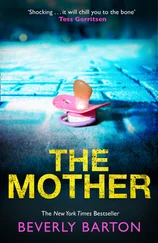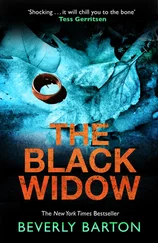“Sorry, Jean, but would it be all right to use your loo?” she said, smiling apologetically. “Tea, it goes straight through you, doesn’t it? I’ll make us another drink if you like.”
Jean nodded and rose from her seat to guide the way. “It’s through here,” she said, standing aside so Kate could edge past into the peachy haven of the downstairs loo.
Washing her hands with the perfumed guest soap, Kate looked up and caught her expression in the mirror. She looked a bit tired, she thought, smoothing her unruly hair down and tapping the bags under her eyes with her fingertips, as instructed by the girl who did her occasional facials.
In the kitchen on her own, she idly read the notes and magnets on the fridge while she waited for the kettle to boil. Shopping lists and holiday souvenirs—nothing much for her here. A photo of the Taylors taken in a beach restaurant showed the couple smiling and raising their glasses to the camera. Glen Taylor, all tousled dark hair and holiday smile, and Jean, dark blond hair done for the occasion and tucked neatly behind her ears, going-out makeup slightly smudged by the heat, and that sideways glance at her husband.
Adoring or in awe? Kate wondered.
The last couple of years had clearly taken their toll on the woman in the photo. Jean was sitting waiting for her in cargo pants, baggy T-shirt, and cardigan, her hair escaping from a stubby ponytail. Steve was always teasing her about how she noticed the little things, but it was part of the job. “I’m a trained observer,” she’d joked, and delighted in pointing out tiny, telling details. She’d immediately spotted the damage to Jean’s rough and cracked hands— hairdresser’s hands , she’d thought to herself—and the skin around the nails, frayed from the widow’s nervous chewing.
The lines around her eyes told their own story.
Kate took her phone out and photographed the picture. She noted that everything in the kitchen was immaculate, nothing like her own, where her teenage sons would, no doubt, have left a trail of detritus from their abandoned breakfast—stained coffee mugs, souring milk, half-eaten toast, a lidless jar of jam with a knife sticking out of it. And the obligatory filthy football kit festering on the floor.
The kettle—and thoughts of home—clicked off, and she made the tea and carried the mugs through on a tray.
Jean was staring into space, her teeth working on her thumb.
“That’s better,” Kate said, plonking herself down. “Sorry about that. Now, where were we?”
She had to admit, she was beginning to worry. She’d spent nearly an hour with Jean Taylor and had a notebook full of bits and pieces about her childhood, early married life. But that was all. Every time she edged a bit closer to the story, Jean would change the subject to something safe. They’d had a long discussion about the challenges of bringing up kids at one point, and then there had been a brief interlude when Kate had finally taken one of the insistent calls from the office.
Terry was beside himself when he heard where Kate was. “Brilliant,” he yelled down the phone. “Well done—what’s she saying? When can you file?”
Under the widow’s watchful eyes, Kate muttered: “Hang on a minute, Terry. The reception isn’t very good here,” and slipped into the back garden, signaling mock irritation to Jean with a weary shake of her head.
“For God’s sake, Terry, I was sitting next to her. I can’t really talk now,” she hissed. “It’s a bit slow, to be honest, but I think she’s beginning to trust me. Let me get on with it.”
“Have you got her under contract yet?” Terry asked. “Get her under contract, and then we can take our time getting the full works.”
“I don’t want to scare her off by pushing things, Terry. I’ll do my level best. Speak later.”
Kate pressed the off button on the phone with feeling and considered her next move. Maybe she just needed to mention the money straightaway. She’d done the tea and sympathy, and now she had to stop dancing around the edge.
After all, Jean might be hard up now that her husband was dead.
He wasn’t there to provide for her anymore. Or to stop her from talking.
FOUR
The Widow
WEDNESDAY, JUNE 9, 2010
She’s still here, an hour later. Before today, I’d have asked her to go. I’ve never had a problem before telling the press people to get lost when they knock. Easy when they are so rude. “Hello,” they say, then straight into their questions. Horrible, intrusive questions. Kate Waters hasn’t asked anything hard. Yet.
We’ve talked about all sorts of things: when Glen and I bought, the price of property around here, what we’ve done to it, the price of paint, the neighborhood, where I grew up and where I went to school, that sort of thing. She chimes in with everything I say.
“Oh, I went to a school like that. I hated the teachers. Didn’t you?” That kind of thing.
Makes me feel I’m chatting to a friend. That she’s just like me. Clever really, but maybe it’s what she does every time she does an interview.
She’s not so bad really. I think I could quite like her. She’s funny and seems kind, but maybe it’s all an act. She’s telling me about her husband—her “old man,” as she calls him—and how she must give him a ring later to let him know she might be home late. Not sure why she’ll be late—it isn’t even lunchtime yet and she lives only thirty minutes around the South Circular—but I tell her she needs to ring straightaway or he’ll worry. Glen would’ve worried. He’d have given me hell if I stayed out without telling him. “It’s not fair on me, Jeanie,” he’d have said. But I don’t tell her that.
Kate is laughing and says her old man is used to it now, but he will complain because he’ll have to deal with the kids. She’s got teenagers, she tells me, Jake and Freddie, with no manners and no respect.
“He’ll have to cook dinner,” she says. “But I bet he orders a pizza. The boys’ll love that.”
The boys are driving her and the old man mad, apparently, because they won’t clean up their bedrooms.
“They’re living in a pigsty, Jean,” she says. “You won’t believe how many cereal bowls I found in Jake’s room. Practically a dinner service. And they lose socks every week. Our house is like the Bermuda Triangle of footwear,” and she laughs again, because she loves them, pigsty or not.
All I can think is: Jake and Freddie. What lovely names. I stash them away for later, for my collection, and I’m nodding like I understand how she feels. But I don’t, do I? I’d have loved her problems. I’d have loved to have a teenager to nag.
Anyway, I find myself saying out loud, “Glen could be a bit difficult when I let the house get in a mess.” I just wanted to show her I had my own fair share of problems, that I was just like her. Stupid, really. How could I ever be just like her? Or anybody? Me?
Glen always said I was different. When we were going out, he’d show me off, telling his mates that I was special. I couldn’t figure it out really. I worked in a salon called Hair Today—Lesley’s, the owner’s, little joke—and spent all my time shampooing and making cups of coffee for menopausal women. I thought hairdressing was going to be fun—glamorous even. Thought I’d be cutting hair and creating new styles, but at seventeen, I was bottom of the ladder.
“Jean,” Lesley would call across to me, “can you shampoo my lady and then sweep up around the chairs?” No please or thank you.
The customers were all right. They liked telling me all their news and problems because I listened and didn’t try to give them advice, like Lesley. I nodded and smiled and daydreamed while they rabbited on about their grandson and his glue sniffing or the neighbor who was throwing her dog mess over the fence. Whole days would go past without me giving an opinion beyond “That’s nice” or making up holiday plans to keep the conversation going. But I stuck at it. I did the courses, learning how to cut and color, and started getting my own clients. It wasn’t very well paid, but I wasn’t really fit for anything else. Didn’t work at school. Mum told people I was dyslexic, but the truth is, I couldn’t be bothered.
Читать дальше












